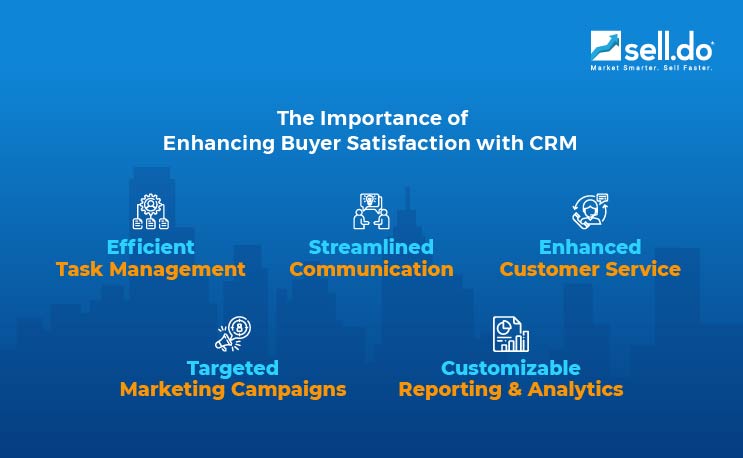Introduction:
In today's competitive real estate market, sustaining customer relationships is paramount. Effective customer retention hinges on enhancing loyalty through strategic communication and personalized interactions. However, managing these aspects manually is impractical due to the sheer volume of customers and transactions.
This is where a Real Estate CRM for buyer satisfaction becomes crucial. By centralizing customer information and interactions, CRM systems facilitate more organized, efficient, and personalized communication. They provide real estate professionals with the tools necessary to cater to each client's unique needs and preferences, ultimately improving customer loyalty and retention. The use of a CRM system streamlines the entire customer management process, ensuring that no client feels overlooked and every interaction is tailored for maximum engagement and satisfaction.
In this blog, we will discuss why Real Estate CRM is a Must for Customer Retention. As the real estate market grows increasingly competitive, the ability to sustain and enhance customer relationships becomes crucial.
The Importance of Enhancing Buyer Satisfaction with CRM

-
Efficient Task Management:
Efficient task management is a cornerstone of effective real estate operations, and Real Estate CRM plays a pivotal role in this area. By centralizing the scheduling of appointments, follow-ups, and property showings, CRM ensures that no task is overlooked. For example, a CRM system can automate reminders for agents to contact prospects, ensuring timely follow-up that keeps the agency at the forefront of clients' minds. Additionally, these systems can delegate tasks based on agent availability and expertise, optimizing the workflow and improving the efficiency of the team.
This level of organization minimizes human error and enhances productivity, making CRM an indispensable tool for real estate businesses aiming to streamline their operations and enhance client engagement.
-
Streamlined Communication:
CRM systems revolutionize communication channels within real estate businesses by providing tools that ensure consistent and effective interactions with clients. A prime feature is the ability to automate communication, such as sending personalized emails or SMS messages on scheduled dates or after specific triggers, like a client visiting a property.
This automation ensures that clients receive timely updates and information, which helps in building trust and satisfaction. Furthermore, CRM platforms can integrate with various communication tools, enabling agents to manage all interactions from a single interface. This consolidation reduces the chances of miscommunication and ensures that every client interaction is recorded and accessible, facilitating better service and follow-up.
-
Enhanced Customer Service:
Enhancing buyer satisfaction with real estate CRM is significantly achieved through improved customer service. CRM systems provide agents with quick access to complete client histories, including past communications, preferences, and feedback, enabling personalized service that anticipates client needs. For instance, if a client previously expressed interest in properties with eco-friendly features, the CRM can highlight new listings that match this preference. Additionally, CRM supports real-time interaction capabilities, allowing agents to respond promptly to inquiries and issues.
This responsiveness demonstrates the company's commitment to customer care, increasing client satisfaction and loyalty. The ability to quickly resolve issues and provide information based on comprehensive data is a testament to the enhanced customer service facilitated by CRM systems.
-
Targeted Marketing Campaigns:
CRM systems enhance the effectiveness of marketing efforts in the real estate sector by enabling the creation of targeted campaigns that speak directly to the needs of specific customer segments. Utilizing detailed analytics and customer data stored within the CRM, marketers can identify specific client groups who are more likely to respond to particular property offerings.
For example, CRM data might reveal a segment of clients interested in luxury properties in a specific neighborhood; marketers can then design bespoke email marketing campaigns featuring listings that align with these interests. This targeted approach not only increases the relevance of marketing messages but also improves the efficiency of marketing spend by focusing resources on high-potential clients. Moreover, CRM tools can track the success of these campaigns in real-time, allowing for quick adjustments to optimize performance and ROI.
-
Customizable Reporting and Analytics:
Real estate CRM systems offer powerful customizable reporting and analytics features that are crucial for refining business strategies and enhancing operational efficiencies. These tools allow real estate firms to generate detailed reports on sales trends, customer behavior, campaign effectiveness, and more.
For instance, analytics can show which property types are most popular in each season, guiding agents on which listings to prioritize. Additionally, CRM analytics can identify patterns in customer satisfaction and feedback, providing actionable insights that drive business decisions.
This level of detailed analysis helps firms to not only understand their current market position but also to predict future trends and prepare accordingly. By leveraging data-driven insights from CRM reports, real estate businesses can make informed decisions that enhance buyer satisfaction and foster long-term loyalty, reinforcing buyer retention with real estate CRM.
Conclusion:
In today’s highly competitive real estate market, the ability to effectively manage and enhance customer relationships is crucial for success. A robust Real Estate CRM system offers a transformative solution, enabling agencies to not only maintain but also strengthen customer loyalty through personalized and strategic interactions.
By integrating advanced CRM functionalities like task management, streamlined communication, targeted marketing, and comprehensive analytics, real estate professionals can ensure every client interaction is impactful and every opportunity is maximized. These systems are indispensable for businesses aiming to thrive by prioritizing buyer satisfaction and fostering enduring client relationships.
For those in search of an exceptional Real Estate CRM solution, Sell.Do- best real estate CRM software in India offers a comprehensive platform designed to enhance every aspect of customer management. From improving operational efficiency to delivering personalized customer experiences, Sell.Do equips real estate professionals with the tools necessary for success in a dynamic market. If you're looking to elevate your real estate business, explore Sell.Do's CRM capabilities and discover how they can transform your approach to customer engagement and retention.






Leave a comment
Comments (0)
Be the first one to comment.